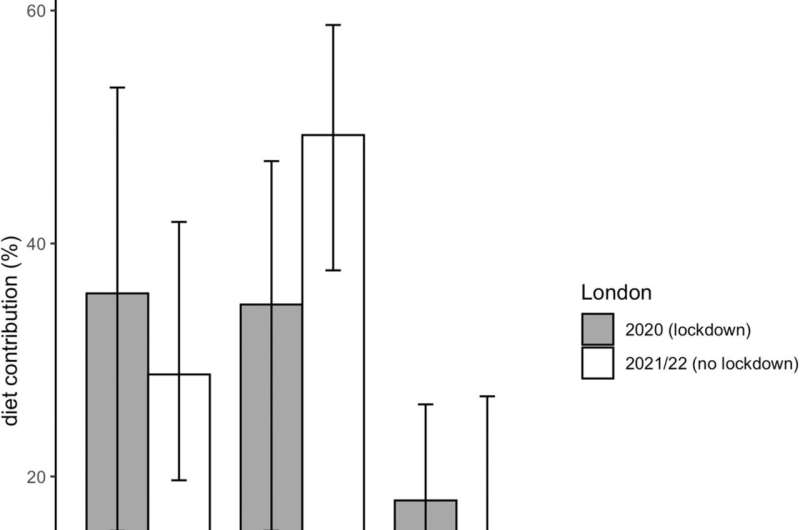This article has been reviewed according to Science X's editorial process and policies. Editors have highlighted the following attributes while ensuring the content's credibility:
fact-checked
trusted source
proofread
London falcons ate fewer pigeons during lockdown

Changes in peregrine falcon diets during COVID-19 lockdowns highlight the impact of human behavior on urban predators. The findings are from a new study published in the British Ecological Society journal, People and Nature.
In the study, researchers from King's College London and University of Bristol found that during lockdown, peregrine falcons in London were forced to change their diet away from pigeons, with fewer of these birds being drawn in by human food supplies such as discarded food waste or direct feeding.
In the study, citizen scientists used online live streams to monitor 31 peregrine falcon nests in 27 U.K. cities over the course of three breeding seasons, the first of which took place during pandemic restrictions.
In London, peregrines took a lower proportion of pigeons as prey (-15%) and replaced them with starlings (+7%) and parakeets (+3%). However, in other cities, pigeons remained the dominant prey.
The study was written by Brandon Mak—a King's College London Ph.D. alongside Ed Drewitt—a University of Bristol ornithologist. Brandon Mak said, "Our results indicate that peregrines in larger, highly urbanized cities like London may be more dependent on, and hence more vulnerable to changes in, human activities which support their prey populations, particularly feral pigeons."
The changes to peregrine diets during the study raises questions surrounding how pest control may affect falcons and other predators that depend on "pest" species. For example, northern goshawk populations in Poland almost halved when farmers stopped rearing domestic pigeons and other poultry that would otherwise have been prey for them.
The management of pest species and their food sources are usually human driven. Therefore reductions in pest species, like pigeons, can force raptors to switch prey or forage further away from their nests, which can result in poorer nutrition from less ideal prey, or a decrease in energy for fitness or reproduction due to the effort spent on hunting.
Brandon Mak explained, "The world is still learning about the consequences of lockdowns on wildlife, which promises to shed light on how human and animal lives are linked in our shared environments."
In the future, the authors of the study hope to contribute towards the Global Anthropause Raptor Research Network (GARRN) which brings together similarly conducted research from the pandemic.
"How did U.K. peregrines fare compared to elsewhere, and how did other raptors experience the lockdowns? We hope these questions will be answered in the coming years," added Mak.
More information: Brandon Mak et al, The raptor lockdown menu—Shifts in prey composition suggest urban peregrine diets are linked to human activities, People and Nature (2023). DOI: 10.1002/pan3.10445
Provided by British Ecological Society



















